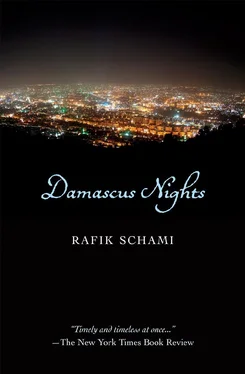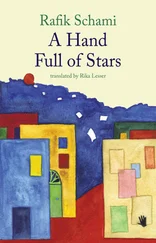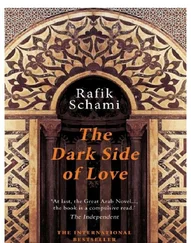Now, it isn't easy in Damascus to find a miracle that all the inhabitants can actually agree on. That's one of the remarkable things about this ancient city. Over its thousand years, Damascus has witnessed thousands of marvels — false prophets, alchemists, magicians, and more — but the Damascenes themselves believe in only one true miracle: the one that is brought about by having the right connections to the right official.
The former minister had carefully lubricated the way so that Salim would receive approval of his pension application without any friction and without a word being said. And Salim couldn't believe his eyes when the friendly lady at the state bank handed him one hundred seventy-five liras. He was so moved he started to cry — but still, he didn't say a word.
The seven friends gathered at Salim's in a modest celebration of the newly acquired pension. Salted pistachio nuts graced the table in addition to the daily tea. The minister basked in the praise the other men were bestowing on him. Only Tuma, the emigrant, seemed pensive.
"What's the matter with you?" asked the barber.
"Nothing. Tomorrow — tomorrow I'll tell you my
idea, " Tuma whispered curtly. His voice
sounded weary, as if his
thoughts were a
burden.
4 Why one proposal made Salim happy but caused his friends to quarrel
It was a little past eleven when the seven old gentlemen headed home. In the large courtyard the neighbors sat in small clusters, enjoying the fresh September night. A few men were playing cards next to the pomegranate tree; across the courtyard some others were hovering over a backgammon board. A group of women had collected around Afifa in front of her door.
Salim carried the empty glasses and the teapot into the kitchen, rinsed them off, and hurried to his room.
"Uncle Salim, come join us!" Afifa called out with a note of pity.
"No, he should come here and teach this beginner how to play backgammon," said one of the players, a plump man with the squeaky voice of a child.
"You're just lucky," his opponent lashed back. "You call that playing? If I'd had just one of your throws, you'd have run to your wife long ago — to cry on her shoulder."
Salim stopped for a minute, gave the backgammon players a nod, smiled, and walked back to his room.
He turned off his light and sat down on the sofa. He was not tired.
The old coachman still couldn't grasp how Faris, the minister, had managed to bring such a hopeless case to such a successful conclusion. He took out his wallet, removed the bills, gave them an approving sniff, and put them back. For the first time in twenty years he was again savoring genuine Ceylon tea. He thought about all he had had to forgo, and he thought about his late wife, how happy she would have been to see him step into the room with his head held high. "Here you are, my gazelle, genuine Ceylon tea, and…" Oh, the things he would have bought for her! Blue velvet for a dress she had yearned for her whole life. Yes, and henna for her hands — he wouldn't forget that. Year after year he had undertaken his trek to the officials but had come home empty-handed every time. His wife, however, had always encouraged him to ask the bishop, or else the son-in-law of the labor minister's chauffeur, for just one more letter of recommendation. She swore that when he did receive his pension she would color her hands with henna and jump for joy like a young bride and dance three times around the courtyard. Salim smiled bitterly.
In the distance someone had turned up the radio very loud. Salim knew for certain it was Mahmoud the butcher, a bachelor who, night after night, listened to the songs of the Egyptian singer Um Khulthum. Every Thursday night, Radio Cairo broadcast Um Khulthum into the wee hours. The butcher was enamored of her voice. He would often cry and dance around his little room, his only partner a pillow pressed inside his arms. And he wasn't the only one who idolized her. Millions of Arabs loved her so much that no head of state who took himself seriously dared give a speech on a Thursday evening — not one single Arab would have listened.
Like a wave, the singer's voice surged out of the room and across the small courtyard of the neighboring building, over to the dovecote, past the walkway crowded with flowers and climbing plants, and finally broke upon the wall. The sound cascaded into Salim's own courtyard and kept its course unerringly through the flood of other voices until it streamed into his ear.
Salim had always been a good listener, but silence simply didn't suit him. Only now, in the stillness of his soul, did he first discover that every voice has its own peculiar taste. His ear became a magical palate. He flitted from one voice to another like a butterfly. Um Khulthum's song had the beauty of a patch of carnations so carefully tended that not a single thistle strayed inside.
Salim tarried for a while in the singer's well-kept garden, then he was drawn away by the homelier blossoms of other voices. A sudden disturbance turned him toward a painful whispering that tasted a little overspiced. Salim smiled: Afifa was exaggerating again, she had a habit of making every burp or broken wind into an almost incurable disease. She would speak very softly, to cajole her listeners into believing that what she was saying was a matter of national security.
Suddenly he heard the concerned voice of an old woman. "God protect us all if it's true what they're saying about a cholera epidemic in the north." Salim froze. Cholera? So it was true! He had heard the news for the first time that very day on the BBC, but the state news agency had denied all reports: "All rumors of a cholera epidemic are completely unfounded! Whoever says there is one is a foreign agent."
"Who told you that?" Afifa wanted to get to what mattered most with cholera epidemics.
"I don't know, I just heard that the hospitals in Aleppo are full," answered the old woman, and Salim recognized her concern despite her lie. He was certain that she knew her source exactly, but there were several unknown guests playing backgammon with their neighbor Tanius, and two strangers had joined the card game at neighbor Elias's. That was reason enough to be cautious about every utterance. People said that the only thing to come out of the union with Nasser's Egypt was a new and improved secret police. No longer known by the modest name "Secret Service," it was now called the "National Security Service." Its nets were being woven even tighter, so tight that fathers and mothers were no longer sure of their own children, and neighbors lived in mutual distrust.
Salim tried to picture the expression on a speaker's face by the taste of his voice. Now and then he would stand up and look across the courtyard to check his accuracy, but his shortsighted eyes were no match for his sensitive ears. A blur of figures was all he could see.
The excited voice of one of the card players, who was threatening to throw down his cards and go home, tasted a little sour. The other players tried to calm the man down and assured him that no one had so much as glanced at his hand. Afifa and her guests were also whispering their concern, since the man was known for his temper. But the more the other players tried to pacify the man, the angrier he became. Finally one of the men he was accusing took up the threat, threw down his own cards, and said in a voice that was quiet but tasted of fire: "Go on! Leave! You're a miserable loser, anyway. We're just trying to have some fun, understand?" Each word, quiet as it was, bored into the ears like a flaming arrow. The player who had started the row in the first place immediately whimpered an apology. Salim smiled with satisfaction.
Salim stayed up the entire night, sitting on his sofa, even after all the neighbors' guests had gone home.
Читать дальше












